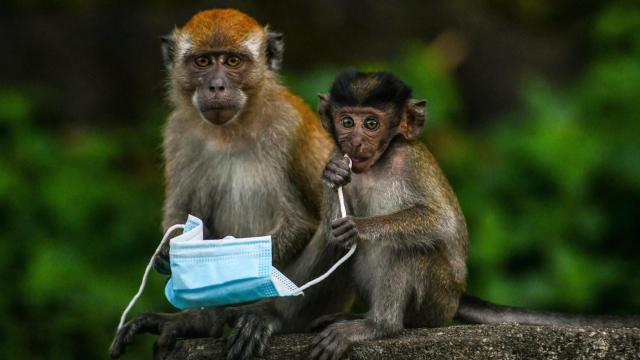Over the weekend, Chinese health officials reported the recent death of a veterinarian caused by the Monkey B virus, which he caught from one of the animals he handled. Though often fatal if untreated, the virus rarely infects humans and isn’t thought to be very contagious.
Monkey B is a species of herpesvirus that’s had many different names (including just B virus), but is now formally known as Macacine alphaherpesvirus 1, or McHV-1. The name is a reference to its natural host, the broad genus of old world monkeys known as macaques. Genetically, it’s a very close relative of the herpes simplex-1 virus and herpes simplex-2 virus, or HSV-1 and HSV-2, two of the most common forms of herpes in humans. HSV-1 and HSV-2 can both cause genital herpes or cold sores, but HSV-1 tends to cause the latter and HSV-2 the former.
Like HSV-1, Monkey B in macaques tends to cause mild cold sores or no symptoms at all. But it’s capable of causing severe, often neurological illness on the rare occasions when it manages to sicken people. Since its discovery in the 1930s, according to the U.S. Centres for Disease Control and Prevention, there have been at least 50 reported cases of Monkey B in humans, with 21 people dying as a result. Most of these victims, like the latest case in China, contracted it through close contact with the bodily fluids of acutely infected macaque monkeys (many herpesviruses can lay dormant in the body after the acute infection).
This past Saturday, officials at China’s version of the CDC reported the case. According to the report, the victim was a 53-year-old veterinarian in Beijing who worked at a research institute focused on primate breeding. In mid-March, he dissected two dead monkeys. About a month later, he developed nausea and vomiting, along with fever and other, undescribed neurological symptoms.
By mid-April, testing of his spinal fluid indicated the possible presence of Monkey B, and further blood and saliva samples were collected from the man and two of his close contacts (a male doctor and female nurse). Though the testing confirmed his infection, the other two people tested negative. Sadly, after more than a month of several hospital trips, the man died from his infection on May 27. According to health officials, it’s the first known case and death attributed to Monkey B ever documented in China.
Monkey B may be highly fatal, even with antiviral therapy now available, but fortunately it appears to be very hard to catch. Only one documented case of human-to-human transmission has been reported since 1932, and that case was particularly peculiar. According to the 1987 CDC report on it, the victim had likely contracted it through applying the same skin cream used to soothe her infected husband’s skin wounds to a spot on her finger that had been scratched hard enough that it had begun to bleed. The husband and two other victims in the same cluster had all caught it from working in a research facility.
That’s not to say the risk is entirely zero to people, even in the U.S. A few years ago, the virus was discovered to be widespread in a population of rhesus monkeys living in Florida’s Silver Springs State Park. Though only a small percentage of these monkeys may be actively shedding the virus at any given time, it’s a good example of why it’s important to not get too close to the wildlife around us, no matter how cute or friendly they may seem.
